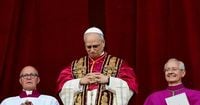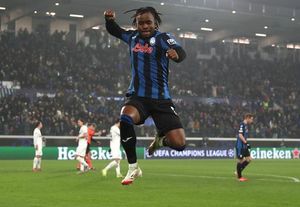In a historic election that has captured the attention of the world, Robert Francis Prevost was elected as the 267th Pope of the Catholic Church on May 8, 2025. Prevost, a 69-year-old cardinal from Chicago, took the name Leo XIV, marking a significant moment as he becomes the first pope from the United States. The election took place during the second day of the conclave in the Vatican, with the cardinals reaching a two-thirds majority by supporting Prevost at the fourth scrutiny.
The announcement of the new pope followed the much-anticipated appearance of white smoke above the Sistine Chapel, a sign that the cardinals had finally reached a consensus after a series of unsuccessful votes. Tens of thousands of people gathered in St. Peter's Square, eagerly awaiting news of the new pontiff. The atmosphere was charged with excitement and hope as the crowd celebrated the momentous occasion.
Prevost's election is notable not only for his nationality but also for his extensive background in church leadership and pastoral care. He has served as the Prefect of the Dicastery for Bishops under Pope Francis, a role that has equipped him with significant experience in the governance of the Church. His journey in the Church began in 1977 when he entered the novitiate of the Order of Saint Augustine in Saint Louis. He took his solemn vows on August 29, 1981, and later graduated from the Catholic Theological Union in Chicago with a degree in Theology.
At the age of 27, Prevost moved to Rome to study Canon Law at the Pontifical University of Saint Thomas Aquinas, where he was ordained a priest on June 19, 1982. His early pastoral work included a mission in Chulucanas, Peru, from 1985 to 1986, which laid the foundation for his deep understanding of Latin American issues and the challenges faced by the Church in that region.
In 1987, he earned a Doctorate with a thesis focusing on the role of the local prior within the Order of Saint Augustine. His leadership skills were recognized early on, as he was elected director of vocations and director of missions for the Augustinian Province of Olympia Fields, Illinois, shortly thereafter. His commitment to education and formation continued with various roles in Peru, including serving as prior of community, director of formation, and professor of Canon Law and Morals in the Major Seminary of Trujillo.
Prevost's career is marked by his ability to bridge diverse perspectives within the Church, as he is seen as a centrist candidate who can gather support from various factions. This quality was crucial during the conclave, where the need for a unifying figure was paramount. His election was not just a victory for American Catholics but also a nod to the global nature of the Church, which has increasingly sought leaders who understand the complexities of different cultural contexts.
As the new pope, Leo XIV inherits a Church facing numerous challenges, including declining attendance in some regions, ongoing discussions about reform, and the need for greater inclusivity. His experience in pastoral care and governance suggests he may prioritize these issues as he begins his papacy.
In his first address as pope, Prevost expressed gratitude and humility, stating, "I am honored to serve the Church in this capacity and look forward to working together with all of you to spread the message of love and compassion that Christ taught us." His words resonated with many, highlighting his commitment to fostering unity within the Church.
The election of Prevost also reflects a broader trend within the Catholic Church's leadership, where there is an increasing recognition of the importance of diverse backgrounds and experiences. With a papacy now held by an American, the Church is poised to engage more deeply with issues pertinent to the United States and beyond.
As the world watches, the implications of Prevost's leadership will unfold in the coming months and years. His ability to connect with both the faithful and the broader community will be crucial as he navigates the complexities of modern religious leadership.
Prevost's election is a reminder of the evolving nature of the Catholic Church and its leadership. It marks a new chapter in the Church's history, one that promises to be filled with both challenges and opportunities for growth. The faithful around the world are hopeful that Leo XIV will lead with wisdom and compassion, embodying the values that are essential to the Church's mission.
In the days following the election, many are eager to see how Prevost will address pressing issues such as social justice, climate change, and the Church's role in global affairs. His background in missionary work and diocesan management may inform his approach to these topics, as he seeks to engage with the world in meaningful ways.
As the new pope settles into his role, the global Catholic community is poised for a period of reflection and renewal. The anticipation surrounding Prevost's papacy is palpable, and many are hopeful that he will inspire a new generation of Catholics to deepen their faith and engage with the world around them.
Ultimately, the election of Robert Francis Prevost as Pope Leo XIV is a significant milestone not just for American Catholics but for the entire Church. It symbolizes a commitment to inclusivity and understanding in a time of great change, and it serves as a reminder of the Church's enduring mission to spread love and compassion across the globe.
As the world turns its eyes toward the Vatican, the journey of Leo XIV begins, and with it, the hopes and prayers of millions of Catholics worldwide.




